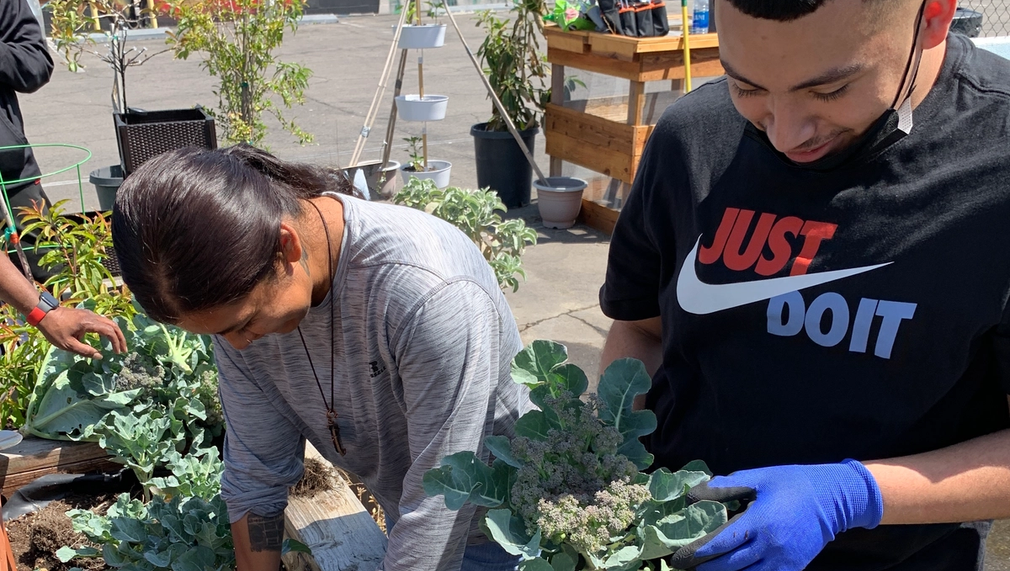Rebel Garden Project: Entrepreneurship and Food Justice
The Rebel Garden Project (RGP) offers an opportunity for South L.A. teens and young adults to become empowered in climate resilience and food sovereignty while working towards entrepreneurial careers in creative or food-based fields. Besides learning how to build and cultivate urban food gardens, participants can learn how to start a certified farmers market in their own community, helping address both income inequality and the food desert issue in South L.A.

Please list the organizations collaborating on this proposal.
Youth Justice Coalition / Chuco's Justice Center FEAST for All Los Angeles
What is the primary issue area that your application will impact?
BIPOC- and Women-Owned Businesses
In which areas of Los Angeles will you be directly working?
South LA
In what stage of innovation is this project, program, or initiative?
Expand existing project, program, or initiative
What is your understanding of the issue that you are seeking to address?
In L.A. County, structural racism and systemic oppression are root causes of intersectional inequities impacting climate resilience, food security and job opportunities. According to a 2019 report by Innovate Public Schools, of the one million low-income BIPOC students in L.A. County, only 15% are enrolled in a top public school, meaning 85% receive an education that does not close the achievement gap. The Rebel Garden Project (RGP) addresses the root cause of these inequities by striving to empower BIPOC, systems-impacted youth with access to educational resources, sustainable and creative opportunities, and eventually, careers. Another problem RGP confronts is the food system in South L.A. by teaching youth to grow fresh produce to nourish themselves and their community. RGP practices a shared leadership model that respects the power and autonomy of BIPOC youth/system-impacted folks in working together to challenge the systems of oppression impacting these communities.
Describe the project, program, or initiative this grant will support to address the issue.
The Rebel Garden Project (RGP) is a food justice and urban gardening internship for youth in South Los Angeles. RGP was created in partnership with the Youth Justice Coalition and students from FREE L.A. High School, an alternative school program for systems-impacted teens and young adults. The Rebel Garden itself began as 3 small, raised planter beds in a parking lot in 2019, as a side project of FREE L.A. students and community members. In 2021, RuckusRoots was invited to offer arts and ecology programming to help the garden's caretakers engage more FREE L.A. students and achieve their goals for the garden. We called our pilot program The Rebel Garden Project (RGP), which launched in March, 2022. Students received hands-on experience with local artists and master gardener Kimble Deleon, learning the fundamentals of urban gardening as well as visual arts lessons. Together we built more gardening beds, created artistic signage, a greenhouse, a native pollinator garden, and a drip irrigation system. Our proposed project is continuation and expansion of RGP, allowing us to build upon learnings and outcomes of the pilot, and achieve more community-driven goals for the space. In this round, our emerging gardeners will also receive entrepreneurial training in areas that combine both gardening and business development in order to start a local farmers market that sells produce and seeds from The Rebel Garden itself.
Describe how Los Angeles County will be different if your work is successful.
Our vision of a creative, vibrant and climate-resilient Los Angeles begins by acknowledging that systemic and structural racism are key barriers to achieving it. South Los Angeles is a community both historically and currently impacted by these issues. RGP's programming model combats this by engaging and empowering youth and key residents of South L.A. at all levels of program design and implementation, from centering the voices of our BIPOC participants and leaders to sharing resources and support. A successful program would mean graduating at least 20 interns, empowered with new skills brought forth through our intersectional curriculum that focuses on resource sharing, skill-building and accessibility. Another successful guidepost would be the creation of a Rebel Garden Farmers Market, to help increase access to fresh, locally-sourced produce, nourish the South Los Angeles community, and improve its climate resilience in the process.
What evidence do you have that this project, program, or initiative is or will be successful, and how will you define and measure success?
In our Rebel Garden Project pilot, we used pre and post surveys of participants to measure outcomes in various areas. Our results were the following: • Knowledge about soil health increased 26% • Ability to identify and care for plants increased 13% • Confidence in designing a garden increased 19% • Ability to work collaboratively in a group increased 22% In our expanded Round 2 of The Rebel Garden Project, we would use the same method of pre and post surveys to measure the above outcomes, as well as the following additional outcomes in our emerging gardeners: • Confidence in applying for a permit and/or business license • Confidence in designing a logo and branding materials • Ability to grow and harvest crops and seeds • Feelings of connection to community and nature • Confidence in ability to generate and monitor an income stream
Approximately how many people will be impacted by this project, program, or initiative?
Direct Impact: 30
Indirect Impact: 400
Describe the specific role of the partner organization(s) in the project, program, or initiative.
The Youth Justice Coalition will be our partner site for this program, providing a space to work with the youth, grow food and host our farmer's market. YJC is a collective space where members and organizations involved work together to provide shared leadership that is most beneficial to the community and larger justice movement. Our collaborator FEAST will help participants hone their "food stories", connecting them to their persol relationship to food through topics such as “Family Food History,” “Vision for Health,” “Impact of Social Networks,” and “Persol Commitment.” Live cooking demos, food safety, and sanitary best practices will also be incorporated by FEAST.